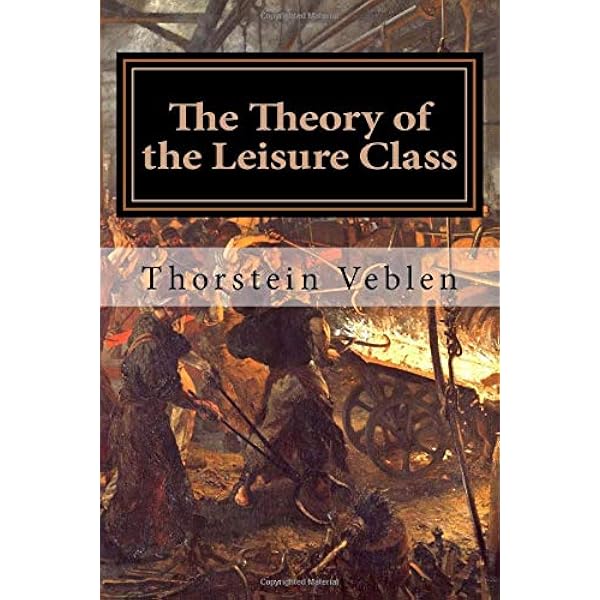Theory of the leisure class: A valuable perspective
In 1899, Thorstein Veblen published his seminal work," The Theory of the Leisure Class" in which he explored the concept of leisure and consumption in modern societies. Veblen critiqued the social and economic values of the upper classes and the impact of these values on the broader society.

Over a century later, Veblen's ideas continue to be relevant and insightful, making his theory a worthy subject for discussion and examination. This article will provide an overview of Veblen's theory and reflect on how it holds up in today's society, providing a status update on the relevance of his ideas.
The Leisure Class Defined
The leisure class comprises individuals with high levels of income and wealth. They engage in leisure activities and consumption patterns that showcase their status and prestige. These activities include, for example, owning expensive cars and homes, wearing high-end clothing and jewelry, and taking luxury vacations. According to Veblen, the leisure class is a new social phenomenon that is emerging as a result of the transition from an agrarian to an industrial economy. In the agrarian economy, the upper class was defined by its ownership of land and by its political power, whereas in the industrial economy, the upper class is defined by its control over the means of production and its ability to enjoy leisure.
How Does the Leisure Class Affect Society?
 Veblen argues that the leisure class has a profound impact on society. Shaping its values, beliefs, and behaviors. The leisure class is seen as a status symbol and its members are highly regarded and admired. As a result, leading others to aspire to join their ranks. Focusing on status and prestige creates a culture of consumerism and materialism. This leads to resource waste and an over-emphasis on material wealth. The leisure class prioritizes status and prestige over productive work, which fosters a culture of consumerism and materialism. This encourages people to consume goods and services for their symbolic value rather than their utilitarian purpose. As a consequence, there can be an excessive emphasis on material wealth, which can result in the inefficient use of resources, and harm the well-being of people and the planet. Unfortunately, this emphasis on status symbols can also perpetuate social inequality.
Veblen argues that the leisure class has a profound impact on society. Shaping its values, beliefs, and behaviors. The leisure class is seen as a status symbol and its members are highly regarded and admired. As a result, leading others to aspire to join their ranks. Focusing on status and prestige creates a culture of consumerism and materialism. This leads to resource waste and an over-emphasis on material wealth. The leisure class prioritizes status and prestige over productive work, which fosters a culture of consumerism and materialism. This encourages people to consume goods and services for their symbolic value rather than their utilitarian purpose. As a consequence, there can be an excessive emphasis on material wealth, which can result in the inefficient use of resources, and harm the well-being of people and the planet. Unfortunately, this emphasis on status symbols can also perpetuate social inequality.
Is the Leisure Class Still Relevant Today?
Veblen's theory of the leisure class remains relevant today. Because their behavior and consumption patterns still shape contemporary society. Their focus on status, prestige, and material possessions contributes to a culture of consumerism and materialism. Additionally, the leisure class plays a crucial role in developing and disseminating cultural and aesthetic values. Furthermore, the concept of the leisure class has evolved, becoming more diverse and inclusive. Social media enables people to display their leisure and consumption, creating new forms of conspicuous consumption. As a result, Veblen's theory provides valuable insights into the modern phenomenon of the leisure class and highlights the need for a more sustainable and equitable society.
Veblen's Theory of the Leisure Class and Its Relevance to Vietnam's Upper Class

The Emergence of the Upper Class in Vietnam
One defining characteristic of Vietnam's upper class is their ownership of high-end properties. From luxury apartments to sprawling villas, owning property is a key marker of status and wealth. According to a report by Savills Vietnam, the demand for high-end properties in Vietnam is driven by the growing number of high-net-worth individuals in the country.
Defining the Upper Class through Properties Ownership
However, the focus on status symbols and materialism perpetuated by the leisure class can have negative impacts. In Vietnam, this is evident in the over-emphasis on material wealth and consumerism. People are encouraged to consume goods and services for their status value, rather than for their utilitarian value. This results in a waste of resources and can contribute to environmental degradation.
The Impact of the Upper Class on Consumerism in Vietnam
Understanding Veblen's Theory of the Leisure Class can provide insights into the behavior and values of Vietnam's upper-class today. By recognizing the role of status symbols and materialism in their consumption patterns, we can better address the negative impacts and work towards a more sustainable and equitable society.
The Influence of Luxury Travel on the Leisure Class in Vietnam
Luxury travel packages for the upper class have become increasingly popular in Vietnam. Companies such as AQBooking offer all-in-one packages that include Michelin-rated hotels and restaurants, yacht services, and private jets. This trend reflects the leisure class's focus on status, prestige, and material possessions, as highlighted in Veblen's theory.
Luxury Travel Packages for the Upper Class in Vietnam: A Status Update
According to Statista, the luxury goods market in Vietnam is growing rapidly. There is a projected annual growth rate of 9.1% between 2021-2025. This growth is reflected in the increasing popularity of luxury travel packages for the upper class in Vietnam, which provide a range of high-end services for those who can afford them.
The Impact of Luxury Consumption on Society: Lessons from Veblen's Theory in Vietnam
Veblen's theory argues that the leisure class has a significant impact on society. The leisure class's focus on status and prestige creates a culture of consumerism and materialism. This leads to resource waste, an over-emphasis on material wealth, and perpetuates social inequality. Luxury travel packages for the upper class in Vietnam are a clear example of this phenomenon.
The Role of Veblen's Theory in Understanding Vietnam's Upper-Class Today
#ThorsteinVeblen #LeisureClass #StatusUpdate #SocietalValues #Consumerism #Materialism #SocialHierarchy #WealthGap #ModernSociety #Perspective #Mindfulness #Impact #ConsumptionPatterns #WellBeing #Planet